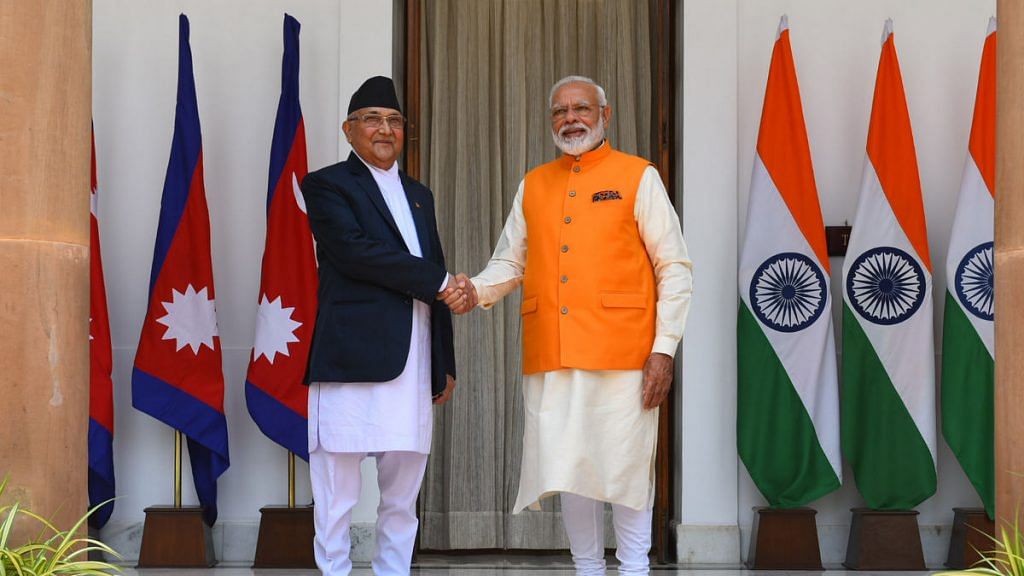New Delhi: The age-old friendly relationship between India and Nepal seems to be rapidly going downhill. Not only did Nepal release a new political map Wednesday, showing the disputed territories of Limpiyadhura, Lipulekh and Kalapani within its borders, its Prime Minister K.P. Sharma Oli even blamed India for the increase of Covid-19 cases in his country.
Reacting to the release of the new map, Anurag Srivastava, spokesperson for the Ministry of External Affairs said Wednesday that India will not accept such “artificial enlargement of territorial claims”, and urged the Nepalese leadership to “create a positive atmosphere for diplomatic dialogue to resolve the outstanding boundary issues”.
Earlier, Oli had also said that those coming from India to his country through illegal channels are spreading the novel coronavirus.
”Indian virus looks more lethal than Chinese and Italian now. More are getting infected,” Oli told the Nepalese parliament Tuesday.
Oli had even taken a shot at India’s national emblem, the Lion Capital, and motto ‘Satyameva Jayate (truth alone prevails)’, by saying New Delhi is now following the motto “simheva jayate (lion, signifying strength, wins)”.
This followed the Oli cabinet’s Monday decision to unveil the new political map, amid rising tensions with India over the three disputed regions. India had issued its new political map six months ago, showing Kalapani as Indian territory.
But MEA spokesperson Srivastava said Wednesday: “The Government of Nepal has released a revised official map of Nepal today that includes parts of Indian territory. This unilateral act is not based on historical facts and evidence. It is contrary to the bilateral understanding to resolve the outstanding boundary issues through diplomatic dialogue. Such artificial enlargement of territorial claims will not be accepted by India.”
He added: “Nepal is well aware of India’s consistent position on this matter and we urge the government of Nepal to refrain from such unjustified cartographic assertion and respect India’s sovereignty and territorial integrity. We hope that the Nepalese leadership will create a positive atmosphere for diplomatic dialogue to resolve the outstanding boundary issues.”
Also read: Why Kalapani is a bone of contention between India and Nepal
‘Upping the game’
Sources said the developments of the last couple of days are a clear indication that Nepal is “upping the game” in its diplomatic battle with India over the disputed territories.
The neighbours have been locked in a dispute over the area near the Lipulekh pass since 2014, but have maintained friendly ties in other matters.
However, while the sources said it’s a “Himalayan challenge”, New Delhi is hopeful matters will settle down when both sides sit and talk in a bilateral format.
Sources in the Oli government told ThePrint it’s “high time” India held foreign secretary-level talks, “if not physically then virtually”.
The ruling Nepal Communist Party has come under severe pressure from opposition parties like the Nepali Congress to “take a stand” against India’s move to open a new road on 8 May connecting the Lipulekh pass with the Kailash-Mansarovar route in China.
Nepal has also threatened to increase military presence along the border.
Also read: Nepal wants India to settle Lipulekh border issue before talks on new Kailash Mansarovar road
Indian Army chief’s comments and China factor
According to sources in Kathmandu, Nepal is “extremely upset” with the recent remarks made by Indian Army Chief General M.M. Naravane that Nepal is ratcheting up the Lipulekh border issue at the behest of “someone else”, clearly pointing fingers at China.
The sources said this might well see Nepal breaking away from another long standing tradition between both countries — decorating the Indian Army chief as the honorary general of the Nepal Army.
“India should also not forget the fact that Gorkhas are an important part of the Indian Army… The recent border skirmish between India and China is totally unrelated to the problems facing India and Nepal,” said a former Ambassador of Nepal to India, who did not wish to be identified.
According to Nepal, Kathmandu never had any issues despite India stationing its troops in Kalapani since 1962, but now, since India has gone a step ahead and inaugurated a new road, Nepal feels compelled to station its armed police force personnel there.
However, meetings between the Chinese ambassador to Nepal and Nepal’s envoy to Beijing after the border row between New Delhi and Kathmandu have also raised eyebrows in India’s diplomatic community.
“The Oli government has made it quite clear that it is titled towards China. China is exercising considerable influence there,” said an Indian official, who refused to be named.
On its part, China has said that the Kalapani row between India and Nepal is a bilateral matter. “The issue of Kalapani is between Nepal and India. We hope the two countries will resolve their differences properly through friendly consultations and refrain from taking any unilateral action that may complicate the situation,” Zhao Lijian, spokesperson for the Chinese foreign ministry, said Tuesday.
Oli also said in his parliamentary speech that he has spoken to the Chinese authorities on the Lipulekh pass.
Also read: Covid has brought back Chinese whispers in Sri Lanka, Nepal. Is India listening?
‘Nepal complicating matters’
Ranjit Rae, veteran diplomat and former Indian ambassador to Nepal, said Nepal was complicating matters with India.
“What PM Oli said in parliament, playing on our national motto of Satyameva Jayate, is not the language of a friend. Countries are free to alter internal boundaries, as Nepal has done after becoming a federal state, or India has done after the reorganisation of Jammu & Kashmir. But changing external boundaries is another matter and will make the situation more intractable,” Rae said.
However, Rae added that these developments, in his personal opinion, are unrelated to the border scuffles that happened recently between Indian and Chinese forces in Ladakh and Sikkim.
Also read: New road to Kailash Mansarovar via Lipulekh Pass and why Nepal is objecting to it
(This report has been updated with India’s official reaction to Nepal’s new map)
